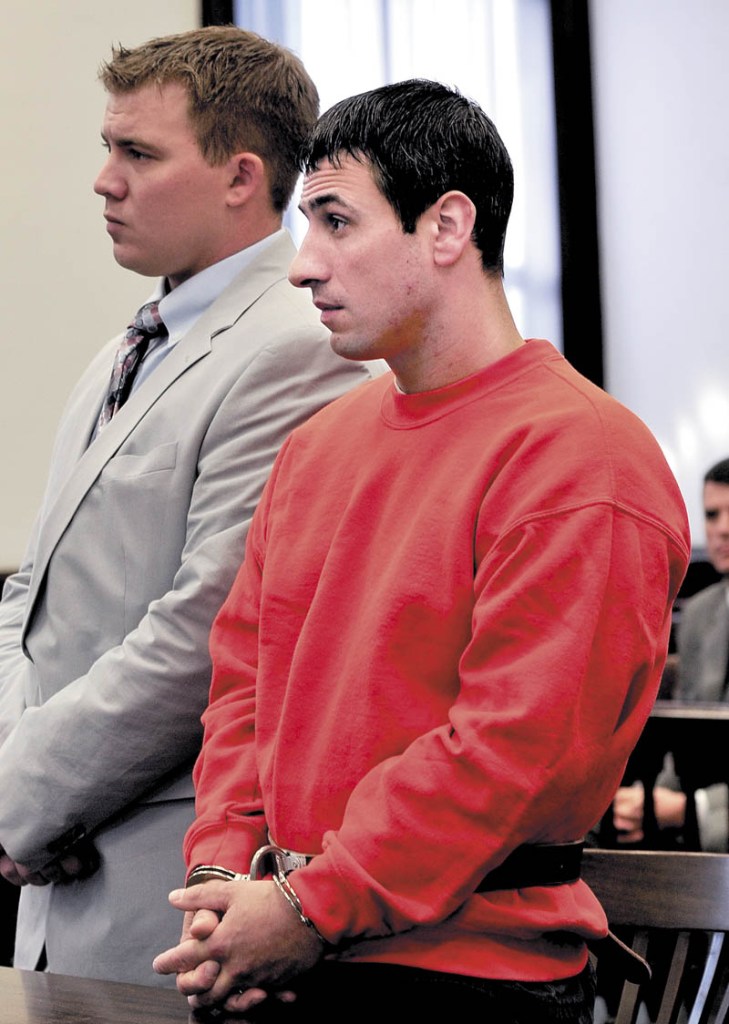SKOWHEGAN — A man suspected of killing his father in Cambridge July 21 was cooperative and willing to talk for a while when he turned himself in to police, an investigator said in court on Tuesday.
The man, Angelo Licata, 34, of Detroit, came voluntarily with two friends to the Waterville Police Department on that July night, said Maine State Police Detective Bryant Jacques, who met Licata at the police station to discuss the circumstances surrounding his father’s death.
That night, Licata signed paperwork agreeing to waive his rights to remain silent and have an attorney present, Jacques told Judge John Nivison in Somerset County Superior Court. Though he was not yet under arrest, Licata then answered questions.
His father, 63-year-old Alfred Licata, had been found dead on a lawn near his home several hours earlier. The medical examiner later determined he died of blunt force trauma to the head.
After the Tuesday court hearing, Nivison will decide whether to suppress certain statements made by Licata to police.
Defense attorney Peter Barnett asked that all of Licata’s discussions with police on July 22, which were audio-recorded, be suppressed because Jacques did not read him a clear Miranda warning — the required statement by police outlining the right to remain silent and right to an attorney — and coerced him into signing a waiver of his rights.
“He was pressured under the threat of arrest to answer questions,” Barnett said.
Assistant Attorney General Andrew Benson argued that some of the interviews should be allowed because Licata said he wanted to answer questions and signed the waiver voluntarily. Benson said there was clearly no inappropriate police conduct.
It was the first time that police and attorneys shed light on the events of the night of July 21, with questioning beginning in the early hours of July 22.
Waterville Police Sgt. Daniel Ames, who was the first officer to testify, said it was after midnight when a dispatcher told him that Licata was in the hallway of the police station and wanted to turn himself in.
When Ames walked into the waiting room, three men were sitting on a long bench. He said Licata stood up, holding a Bible in one hand, and said he had heard police were looking for him. He stated he didn’t want to talk without a lawyer present, Ames recalled.
After checking him for weapons, Ames told Licata someone would be with him shortly. Ames said he did not restrain Licata and he was left unguarded.
Trooper Diane Perkins-Vance was the next officer to arrive, around 12:44 a.m., and she stayed for only a few minutes, she testified. Licata said he had nothing to say without a lawyer, and she told him a detective would arrive shortly. He thanked and blessed her before she left, she said. She told the court that Licata remained in the police station voluntarily.
When Jacques arrived, Licata and his friends were outside, and Licata agreed to talk with Jacques in his police car. Licata blessed his friends, and they left, Jacques said.
Jacques said he read Licata the Miranda warning, and Licata agreed to an interview. Later, Licata told Jacques that if he was not under arrest he would like to leave, and he got out of the car.
As Jacques made a phone call inside the station, Ames came to stay with Licata, who did not try to leave.
Ames testified that while Licata waited “he stated several times that he was in shock from what the trooper had said, from what the trooper had told him.”
Around 3:27 a.m., Jacques said, he returned to conduct a second interview and told Licata he was not free to leave. When asked whether he was responsible for the death of his father, Licata declined to answer. After more interviewing, Licata was taken to Somerset County Jail.
The next evening, Jacques said he got word that Licata wanted to see him at the jail, so the following day he went to meet him. Jacques said he read Licata his Miranda rights again and even told Licata his attorney wouldn’t like that he was meeting with an investigator.
But Licata responded that he wanted the truth known, Jacques said. In particular, Licata said “the Lord” wanted it known, according to Jacques.
Though Jacques didn’t provide details about what Licata disclosed, Jacques said Licata provided a different version of events than during the previous interviews.
Jacques said Licata never appeared to be under the influence of drugs or alcohol. He said he never made any promises to Licata to get him to talk, and he never raised his voice or threatened him.
Erin Rhoda — 612-2368
erhoda@centralmaine.com
Send questions/comments to the editors.



Success. Please wait for the page to reload. If the page does not reload within 5 seconds, please refresh the page.
Enter your email and password to access comments.
Hi, to comment on stories you must . This profile is in addition to your subscription and website login.
Already have a commenting profile? .
Invalid username/password.
Please check your email to confirm and complete your registration.
Only subscribers are eligible to post comments. Please subscribe or login first for digital access. Here’s why.
Use the form below to reset your password. When you've submitted your account email, we will send an email with a reset code.